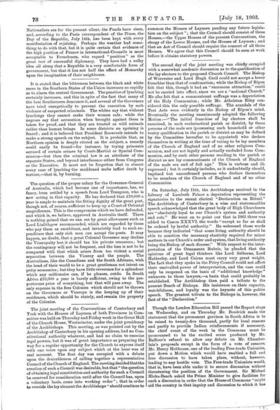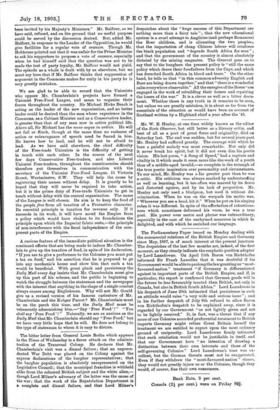Though the London Education Bill passed the Report stage on
Wednesday, and on Thursday Mr. Brodrick made the statement that the permanent garrison in South Africa is to be raised to twenty-five thousand, partly for local reasons and partly to provide Indian reinforcements if necessary, the chief event of the week in the Commons must be pronounced to be the excited scene produced by Mr. Balfour's refusal to allow any debate on Mr. Chamber- lain's proposals except in the form of a vote of censure. Mr. Henry Hobhouse, one of the leading Free-trade Unionists, put down a Motion which would have enabled a full and free discussion to have taken place, without, however, leading to any hostile vote. The Free-trade Unionists would, that is, have been able under it to secure discussion without threatening the position of the Government. Sir Michael Hicks-Beach asked the Prime Minister to give facilities for such a discussion in order that the House of Commons "might aid the country in that inquiry and discussion to which it has
been invited by his Majesty's Ministers." Mr. Balfour, as we have said, refused, and on the ground that no useful purpose could be served by the discussion desired. But, added Mr. Balfour, in response to the Leader of the Opposition, he would give facilities for a regular vote of censure. Though Mr. Hobhouse pointed out that it was unfair for the Prime Minister to ask his supporters to propose a vote of censure, especially when he had himself said that the question was not to be made the test of party loyalty, Mr. Balfour would not yield. The episode as a whole is dealt with by us elsewhere, but we must say here that if Mr. Balfour thinks that suppression of argument in the Commons makes for unity in his party he is very greatly mistaken.











































 Previous page
Previous page